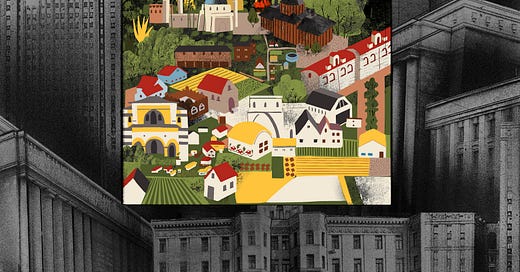russian colonialism 101: about anti-colonial storytellers.
survivors of russian colonialism share their truths
‘Before Ukraine happened, I, unfortunately, just never really saw things through this lens. I never connected the colonialism dots. Why would my mother change her Tajik name to Russian-styled? Why I faced never-ending racism from Russians but never from Ukrainians, who I was always told ‘were the same people?’ Why do Russians keep claiming they ‘civilized’ my country while, in fact, they laid the ground for terrible civil strife?’ my Tajik friend tells me with both anger and pain in their eyes. This meeting started as a work chat over a coffee but quickly descended into a collective therapy session, with both of us venting our generational trauma. Our shared generational trauma, connected to a shared abuser - russia.
I’ve been mainstreaming global awareness about russian colonialism for almost a decade now. And it always felt very isolating, to the point that I’d just constantly doubt myself if this was just a focus I myself imagined and it had no connection to reality. On 24.02.2022 that changed forever. The anti-colonial struggle of the Ukrainian people resisting a genocide waged by russia awakened thousands of new voices all across the russian neighborhood. And they all are ready to tell their truths. Truths about colonial crimes russia has been doing to us for generations and always managing to get away with it: unpunished, unchecked, unshamed.
“Russian stories marginalize ours, they don’t represent us, they kill us. During this genocide, listen to what Ukrainians have to say. We were not heard and taken seriously because this is what colonialism does: silences you to make it easier to kill you and forget about you,’ writes Botakoz Kassymbekova, a prominent Qazaq thinker and researcher of russian colonialism, in what I find to be one of the most power essays about the topic ever written.

‘Our stories differ: we thought we suffered together, but russians think that our suffering was necessary to overcome our “backwardness,” their suffering was necessary to “civilize” us. This difference is crucial: we were never equal. We learned to identify with russians and empathize with them, they learned to despise us. We knew everything russian: culture and ways of life while forced to give up ours. Russians never knew us. Soviet culture fed caricature and racist images of us in the most debased, ridiculed, and humiliated version. They never learned to empathize with us,’ Kassymbekova continues.
As I was reading this essay, suddenly, tears started running down my face. For years the same truths were living inside my head but I never heard anyone else vocalizing them. These truths, spoken louder and by a growing army of indigenous voices, are setting us all free. They help us to start healing. They are the key to making sure historical and generational justice is finally served.
But first, we all need to survive this last battle and make sure this neverending cycle of abuse and enslavement is about to end.
This week I will feature something I recently created that I hope, at least on some level, will contribute to our imminent victory over russian colonialism.

here is what's in store for you this week:
the first storytelling hub to spread public awareness of russian colonialism
how russia-waged genocide in Ukraine awakens other people from former russian colonies to their own identities
how russian colonialism sits comfortably with many Westerners, whose countries often have violent histories of colonialism themselves
collecting severed heads of indigenous people as souvenirs… centuries and genocides later, murderous russian colonialism remains still unchecked and unchanged
curious for more? let's go.




